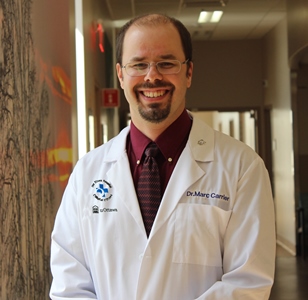 “We can now update the international standards for treating blood clots to be safer and more effective for people with cancer,” says Dr. Marc Carrier, co-author of the study and head of hematology at The Ottawa Hospital and professor at the University of Ottawa. “This will also have a positive impact on patient quality of life.”Thanks to new research published in the New England Journal of Medicine, people with cancer can now take a reduced dose of blood thinning medication to prevent recurring venous thromboembolism (VTE), a type of blood clot. VTE is a common complication from cancer and, after the disease itself, is the second leading cause of death among cancer patients.
“We can now update the international standards for treating blood clots to be safer and more effective for people with cancer,” says Dr. Marc Carrier, co-author of the study and head of hematology at The Ottawa Hospital and professor at the University of Ottawa. “This will also have a positive impact on patient quality of life.”Thanks to new research published in the New England Journal of Medicine, people with cancer can now take a reduced dose of blood thinning medication to prevent recurring venous thromboembolism (VTE), a type of blood clot. VTE is a common complication from cancer and, after the disease itself, is the second leading cause of death among cancer patients.
The randomized trial included 1,766 patients with active cancer who had completed at least six months of treatment for VTE. Patients received either a full (5.0 mg) or reduced (2.5 mg) dose of an oral blood thinner, apixaban, twice daily for 12 months. There was no significant difference in the recurrence of blood clots between the groups (both less than three per cent), and patients in the lower dose group had significantly fewer bleeding events.
“We can now update the international standards for treating blood clots to be safer and more effective for people with cancer,” says Dr. Marc Carrier, co-author of the study and head of hematology at The Ottawa Hospital and professor at the University of Ottawa. “This will also have a positive impact on patient quality of life.”
This study was an international collaboration led by Assistance Publique–Hôpitaux de Paris, with significant contributions from researchers at The Ottawa Hospital, including Dr. Marc Carrier, Dr. Grégoire Le Gal and Daniel Warner.
Funding: Bristol-Myers Squibb–Pfizer Alliance
The Ottawa Hospital is a leading academic health, research and learning hospital proudly affiliated with the University of Ottawa and supported by The Ottawa Hospital Foundation.
